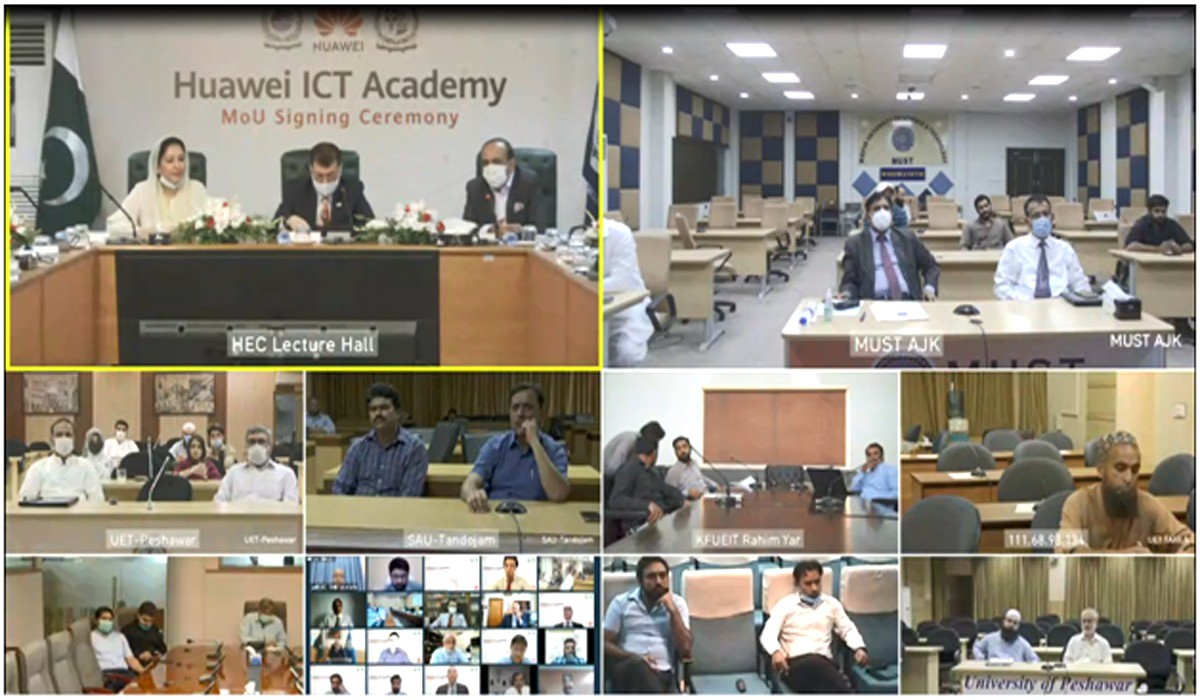The Huawei ICT Academy program will increase the number of training slots for Pakistani students four fold, from 800 per year to over 3,000 per year. A strategic Memorandum of Understanding (MoU) to this effect was signed between the Higher Education Commission (HEC) and Huawei Technologies Pakistan.
Under the MoU, Huawei ICT Academies will be established in eight new universities, which will join existing 15 academies by the end of 2020, bringing the total number of universities to 23. In addition, the Training Academies in 5 of the existing universities will be upgraded. The program will provide important support for the government’s Digital Pakistan initiative.
Chairman HEC Tariq Banuri graced the virtual signing ceremony as chief guest. The event was also attended by Parliamentary Secretary for Federal Ministry of Education and Professional Training Ms. Wajiha Akram, Executive Director HEC Dr. Fateh Marri, Vice President, Public Affairs and Communications, Huawei Middle East Li Xiangyu (Spacelee), and a large number of Vice Chancellors.
Addressing the ceremony, Chairman HEC said that the government is keen to bring about the technological transformation of the country, especially through the Digital Pakistan initiative, and the Huawei ICT Academy Program will provide a great contribution to this objective.
He said that the program also supports HEC’s commitment to investing in the practical skills of Pakistani youth. He mentioned that HEC has launched the new undergraduate education policy, which includes a major focus on enhancing practical learning. “The new undergraduate program will offer students a menu of options to acquire practical skills, including through internships, entrepreneurial training, participation in social clubs, and sports. IT skills have become essential for future success in every field of endeavor.
The Chairman advised the Vice Chancellors to leverage the opportunities provided by the Huawei ICT Academy Program, not only to enhance students’ skills, but also to harness technologies in the universities operations, developing collaboration with other universities, and mobilizing revenues.
He concluded by saying that the MoU was a milestone in the longstanding relationship with Huawei, and is a reflection and reaffirmation of the deep-seated friendship between Pakistan and China. “Each step that we, the Pakistani and Chinese entities, take will further strengthen the Pakistan-China relations”.
Ms. Akram congratulated the HEC and Huawei on taking forward the ICT Academy Program. She said the academia-enterprise cooperation projects, like the Huawei ICT Academy Program, will help build the ICT talent ecosystem in Pakistan. “I would like to thank Huawei technologies for their efforts and investment in Pakistan, and entrusting our youth, specifically those from the rural areas.”
Mr. Spacelee said Huawei has, for many years, been privileged to contribute to the development of Pakistan’s ICT ecosystem together with local partners like HEC. “We are excited to be working with HEC again to expand the opportunities available through the Huawei ICT Academy.” He appreciated HEC’s proactive leadership in the promotion of the digital economy in Pakistan.
Earlier, Dr. Marri shed light on the background of Huawei ICT Academy Program. He said that 800 students have been trained through the program on yearly basis, and that the MoU will provide an opportunity to increase the number to over 3,000 per year. He stated that HEC and Huawei have a shared motive to extend services and expertise in the field of IT and Communications.
The Huawei ICT Academy Program is a global initiative aimed at promotion of ICT technology skills. The program was launched by HEC and Huawei in 2017. It features industry-academia linkages and cooperation with universities in different countries for development, training and certification. It is based on Huawei’s advanced technologies in the ICT area and leading market solutions.
Twenty six universities submitted their proposals to the HEC for joining the program. Following an open and competitive selection process, eight universities were chosen to host the next set of ICT Academies. These are Mirpur University of Science and Technology, University of Central Punjab, Muhammad Nawaz Sharif Agricultural University, Khawaja Fareed UET, Usman Institute of Technology, Sindh Madressatul Islam University, UET Peshawar and the University of Peshawar. The five existing academies which will be upgraded, based on their past performance, are COMSATS University Islamabad, NUST, UET, NED University of Engineering and Technology, and Ghulam Ishaq Khan Institute (GIKI).

